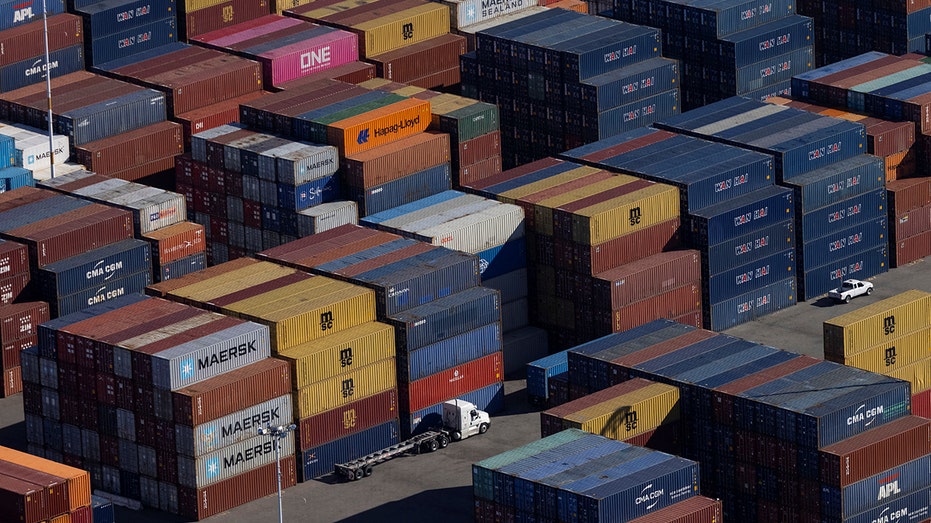West Coast dockworkers still talking after contract expires
The contract that expired last Friday covered 22,000 workers at ports from California to Washington state that handle nearly 40% of U.S. imports
Supply chain is the fabric of US economy: Shipping expert
Red Arts Capital founders Nicholas Antoine and Chad Strader discuss supply chain investing and the future of shipping on 'The Claman Countdown.'
Shipping companies and West Coast dockworkers are still talking in an attempt to prevent a strike that would cripple an already compromised economy stressed by soaring inflation and supply chain woes.
A contract that involves the companies and 22,000 dockworkers expired over the weekend.

Transportation trucks cross the Vincent Thomas Bridge over the main channel as shipping containers are seen stacked on the Evergreen terminal at the Port of Los Angeles in San Pedro, Calif. (AP Photo/Damian Dovarganes, File)
The contract covers workers at ports from California to Washington state, handling nearly 40% of U.S. imports.
"While there will be no contract extension, cargo will keep moving, and normal operations will continue at the ports until an agreement can be reached," said a joint statement from the Pacific Maritime Association and the International Longshore and Warehouse Union.
SUPPLY CHAIN EXPERT WARNS OF RISING RATES GOING INTO PEAK SEASON: ‘I SEE A LOT OF TROUBLE AHEAD’
The ILWU is the union representing Pacific dockworkers, and the Pacific Maritime Association is a trade group for cargo carriers and terminal operators. Its members include such global shipping giants as Maersk and Evergreen Marine.
President Biden met with both sides in Los Angeles last month.

Shipping containers are seen at the container terminal of the port of Oakland, California. (REUTERS/Carlos Barria / Reuters Photos)
Both sides said last month that they were not expecting any work disruptions.
TOYOTA CUTS GLOBAL PRODUCTION AGAIN AS SEMICONDUCTOR SHORTAGES, SUPPLY CHAIN DISRUPTIONS LINGER
Prior to the contract expiring, more than 150 trade groups sent a letter to Biden asking his administration to work with both sides to help get a deal done.
Peak season is approaching for imports as retailers stockpile goods for the fall holidays and back-to-school items.
One issue of concern in negotiations is automation of port facilities.

FILE - A truck arrives to pick up a shipping container near vessels moored at Maersk APM Terminals Pacific at the Port of Los Angeles. (AP Photo/Damian Dovarganes, File / AP Newsroom)
The concern for unions on the issue is it would cost jobs. The Pacific Maritime Association argues that automation will increase employment by enabling ports to move more cargo.
Ports already have been struggling to handle container traffic, much of it from Asia, where ports are heavily automated.
After the COVID-19 pandemic began to take hold in 2020, cargo traffic to ports slumped drastically. But then it recovered and has been booming since.
Soaring demand has led to traffic jams at the twin ports of Los Angeles and Long Beach, which in 2021 alone moved some 20 million cargo containers.
GET FOX BUSINESS ON THE GO BY CLICKING HERE
In January, some 100 ships were waiting to get into the port complex, but that total is now down to 60 or even as low as 20 at times, Port of Long Beach Executive Director Mario Cordero said Tuesday.
Contracts are renegotiated every six years.
The Associated Press contributed to this report.





















